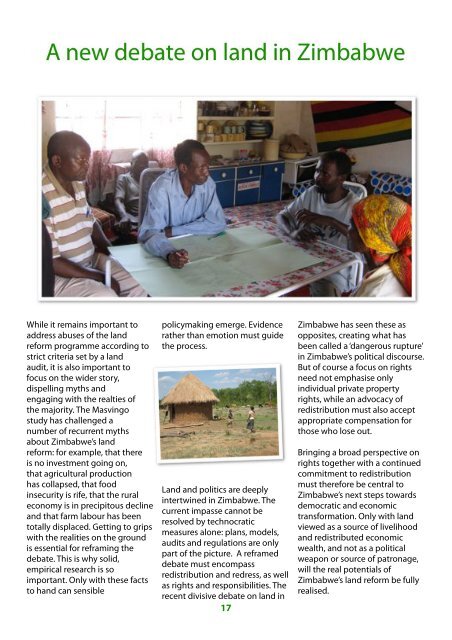Zimbabwe's Land Reform
Zimbabwe's Land Reform
Zimbabwe's Land Reform
You also want an ePaper? Increase the reach of your titles
YUMPU automatically turns print PDFs into web optimized ePapers that Google loves.
While it remains important to<br />
address abuses of the land<br />
reform programme according to<br />
strict criteria set by a land<br />
audit, it is also important to<br />
focus on the wider story,<br />
dispelling myths and<br />
engaging with the realties of<br />
the majority. The Masvingo<br />
study has challenged a<br />
number of recurrent myths<br />
about Zimbabwe’s land<br />
reform: for example, that there<br />
is no investment going on,<br />
that agricultural production<br />
has collapsed, that food<br />
insecurity is rife, that the rural<br />
economy is in precipitous decline<br />
and that farm labour has been<br />
totally displaced. Getting to grips<br />
with the realities on the ground<br />
is essential for reframing the<br />
debate. This is why solid,<br />
empirical research is so<br />
important. Only with these facts<br />
to hand can sensible<br />
policymaking emerge. Evidence<br />
rather than emotion must guide<br />
the process.<br />
<strong>Land</strong> and politics are deeply<br />
intertwined in Zimbabwe. The<br />
current impasse cannot be<br />
resolved by technocratic<br />
measures alone: plans, models,<br />
audits and regulations are only<br />
part of the picture. A reframed<br />
debate must encompass<br />
redistribution and redress, as well<br />
as rights and responsibilities. The<br />
recent divisive debate on land in<br />
17<br />
Zimbabwe has seen these as<br />
opposites, creating what has<br />
been called a ‘dangerous rupture’<br />
in Zimbabwe’s political discourse.<br />
But of course a focus on rights<br />
need not emphasise only<br />
individual private property<br />
rights, while an advocacy of<br />
redistribution must also accept<br />
appropriate compensation for<br />
those who lose out.<br />
Bringing a broad perspective on<br />
rights together with a continued<br />
commitment to redistribution<br />
must therefore be central to<br />
Zimbabwe’s next steps towards<br />
democratic and economic<br />
transformation. Only with land<br />
viewed as a source of livelihood<br />
and redistributed economic<br />
wealth, and not as a political<br />
weapon or source of patronage,<br />
will the real potentials of<br />
Zimbabwe’s land reform be fully<br />
realised.

















